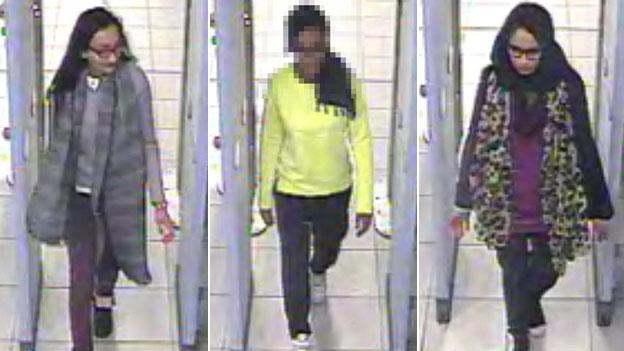Schoolgirl's 'Syria death' prompts call for Prevent review
- Published
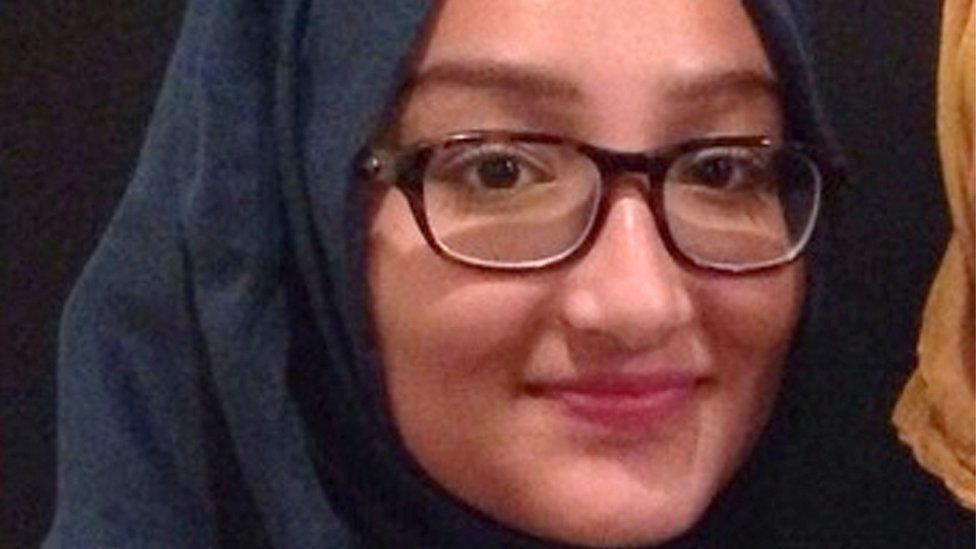
Kadiza Sultana was 16 when she left to join so-called Islamic State
A Labour MP has expressed "huge concerns" about the counter-terrorism strategy in UK schools, after reports one of three east London teenagers who fled to Syria has been killed.
Kadiza Sultana, who joined so-called Islamic State (IS) last year aged 16, is feared dead after an air strike in Raqqa, her family solicitor has said.
Labour's Rushanara Ali said the Prevent strategy needed a "proper assessment".
Security minister Ben Wallace said it had been reviewed "to ensure it works".
Ms Ali, MP for Bethnal Green and Bow told BBC Radio 4's Today Programme the government needed to establish "what's working and what's not".
But Mr Wallace said "ever since Labour introduced Prevent in 2007, the government has continued to review the policy to ensure it works to protect people from being radicalised".
"For Prevent to work we all need to get behind it not stand on the sidelines undermining it," he added.
The Britons signing up for Jihad
Kadiza and school friends Shamima Begum and Amira Abase, both 15 at the time, flew from Gatwick to Turkey on 17 February 2015 after telling their parents they were going out for the day.
The Bethnal Green Academy pupils later entered Syria and were thought to be living in Raqqa, an IS stronghold.
The three girls had been studying for their GCSEs at Bethnal Green Academy, in Tower Hamlets, east London - where they have been described as "straight-A students".
Tasnime Akunjee, a solicitor representing the families of the three schoolgirls, told BBC Newsnight they heard a report of Kadiza's death following a Russian air strike a few weeks ago.
He said they had not been able to independently confirm it because of the nature of information from Syria.

Analysis
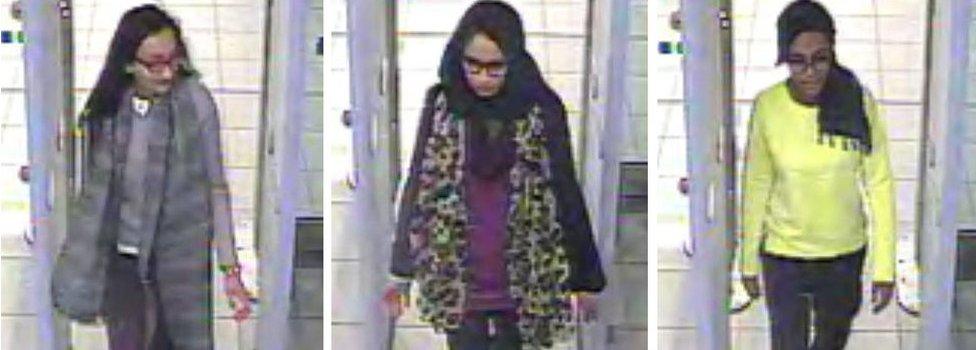
(From left) Kadiza Sultana, Shamima Begum, and Amira Abase travelled to Syria in 2015
By Frank Gardner, BBC security correspondent
Kadiza Sultana and her two travelling companions were part of a surge of young British Muslims heading out to Syria to join so-called IS in a movement that peaked more than a year ago.
Today the surge has turned to barely a trickle.
The latest UK Government counter-terrorism strategy report puts the number of Britons who reached Syria at about 850 - although unofficial estimates are higher.
Of those, about 125 are believed to have been killed, either by air strikes or by fighting on the ground, and about 400 are thought to have returned to Britain.
Anyone known to have travelled to IS-controlled territory is automatically questioned by the police and assessed on a case-by-case basis.
If there is any evidence of terrorist-related activity they face prosecution, but others are steered towards deradicalisation programmes and given counselling, with a view to reintegrating them into society here.
It is the job of the Home Office and the police to make the correct assessments.

Tasnime Akunjee, solicitor: "They [Kadiza's family] are very obviously devastated"
Under laws brought in last summer, schools have a legal obligation, known as the "Prevent Duty", to spot and report individuals who might be vulnerable to extremism and radicalisation.
Schools have to assess the risk of pupils being drawn into extremist ideologies and schools must ensure pupils do not access extremist material online.
Teachers have previously warned the strategy is "shutting down" open debate in schools, encouraging a climate of "over-reaction", and creating "suspicion and confusion" in schools.
The government has said Prevent is playing "a key role" in identifying children at risk of radicalisation.
However, Ms Ali told Today the case of the three schoolgirls highlighted the fact it was not working.
"Many have concerns about how Prevent is being implemented, concerns about young Muslims being stigmatised," she said.
"There needs to be a balance struck to protect young people, to prevent them from being radicalised, but also making sure teachers and other agencies have the proper advice training and support."
She added: "What the government needs to do is do a proper assessment of what's working and what's not and they need to listen to the Muslim community...
"But that requires partnership between communities."
'Extremist propaganda'
Security minister Ben Wallace defended the strategy.
"Up and down the country we are successfully seeing communities, local authorities and ordinary citizens doing their bit to protect the vulnerable from those that would seek to groom them for extremist activities," he said.
"Prevent is for the benefit of us all no matter what faith or community you belong to. As it is with domestic violence or other forms of abuse it is everyone's duty to be proactive to stop those that would subvert our young people."
Sara Khan, co-founder of the counter-extremism organisation Inspire, told Today that she saw Kadiza as a victim, "because she's not an adult".
Young girls who are exposed to radicalisation "lack critical thinking skills", which "is what makes them vulnerable to Islamist extremist propaganda in particular", she said.
She added that girls being exposed to extremist material were "not receiving counter-messages".

The Bethnal Green schoolgirls were among more than 800 Britons who are believed to have left the UK to join IS or other militant groups in Syria and Iraq,
In February 2015 the principal of Bethnal Green Academy, Mark Keary, said there was no evidence that the girls were radicalised at school, adding that pupils could not access Twitter or Facebook on its computers.
It later emerged that, before leaving the UK, Shamima Begum had sent a Twitter message to Aqsa Mahmood, who left Glasgow for Syria in 2013 to marry an Islamic State fighter.
A spokeswoman for the Foreign Office said: "The UK has advised for some time against all travel to Syria. As all UK consular services there are suspended, it is extremely difficult to confirm the status and whereabouts of British nationals in Syria.
"Anyone who does travel to these areas, for whatever reason, is putting themselves in considerable danger."
- Published12 August 2016

- Published4 July 2015
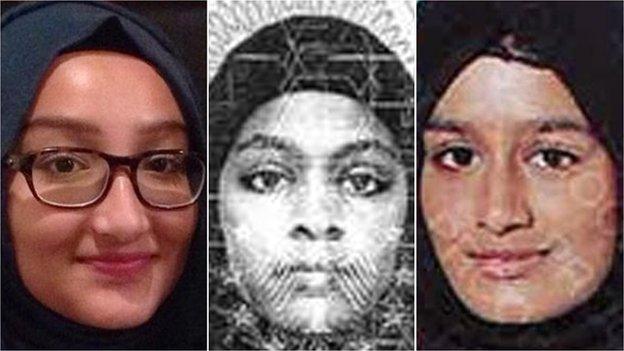
- Published24 February 2015

- Published23 February 2015
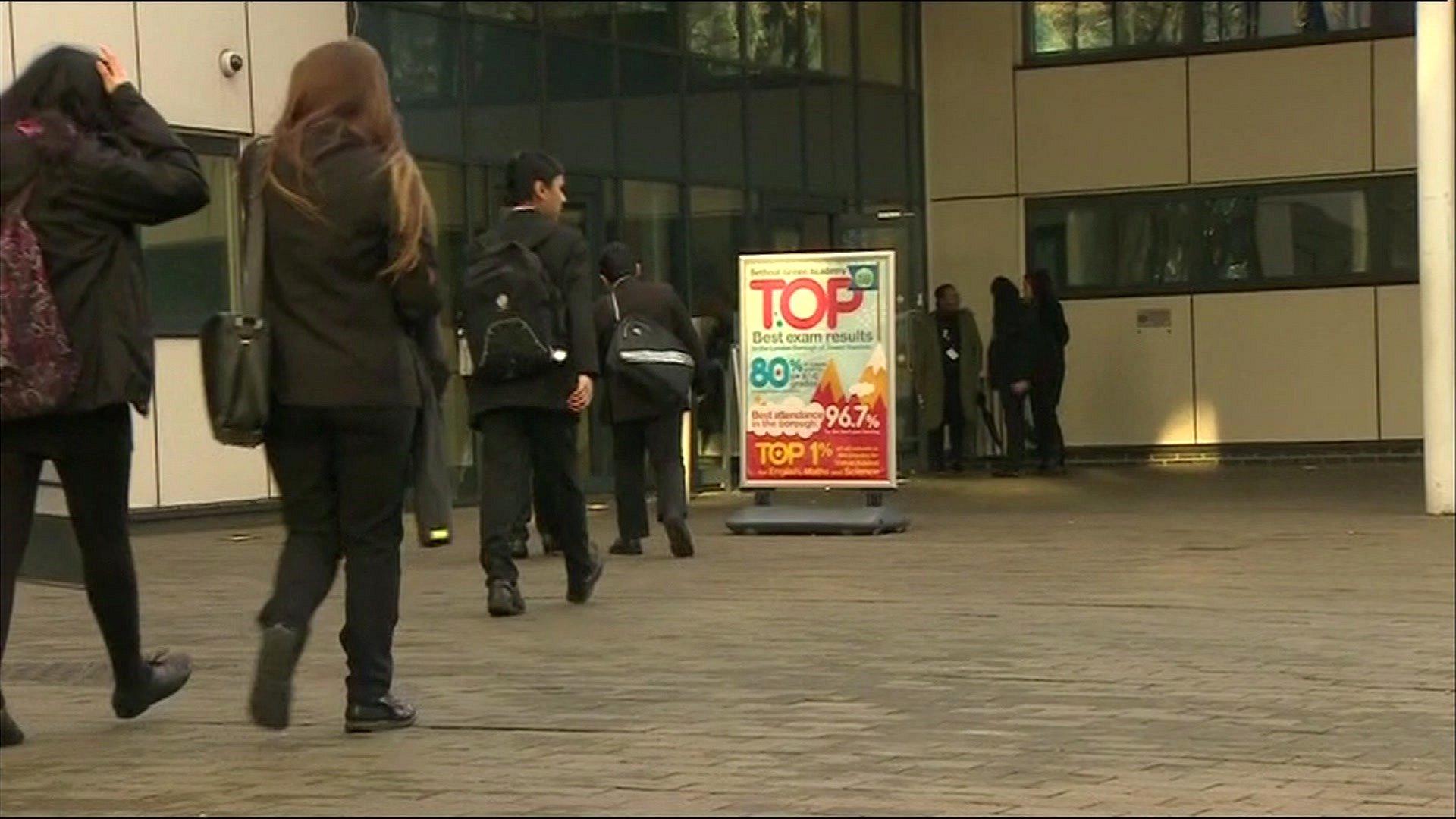
- Published21 February 2015

- Published23 February 2015

- Published21 February 2015
